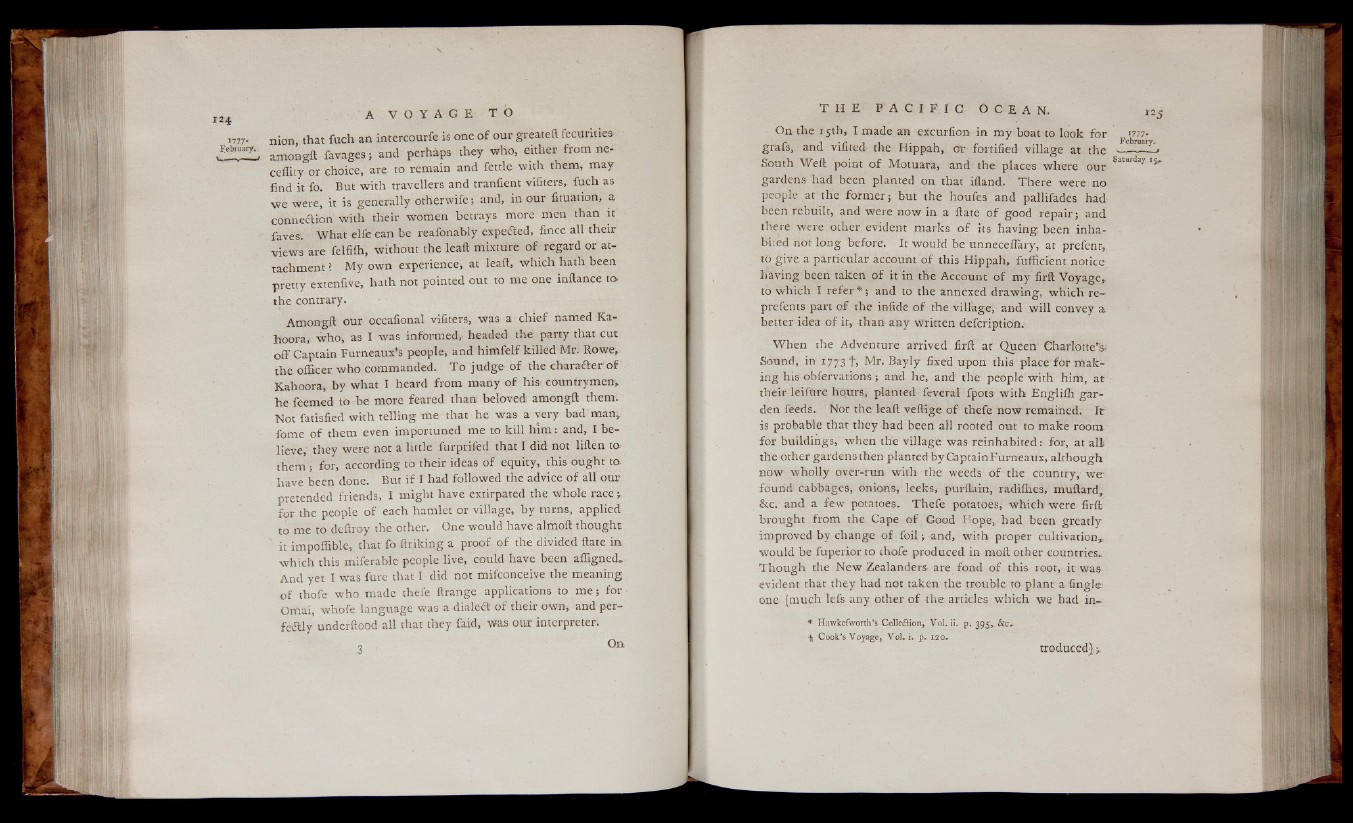
1777*- nion, that fuch an intercourfe is one of our greateft fecunties
amongft favages; and perhaps they who, either from ne-
ceffity or choice, are to remain and fettle with them, may
find it fo. But with travellers and tranfient vifiters, fuch as
■we were, it is generally otherwife| and, in our fituation, a
connection with their women betrays more men than it
faves. What elfe can be reafonably expected, fince all their
views are felfiih, without the leaf! mixture of regard or attachment!
My. own experience, at leaft, which hath been
pretty extenfive, hath not pointed out to me one initance to.
the contrary,
Amongft our occafional vifiters, was a chief named Ka-
hoora,- who, as 1 was informed, headed the party that cut
off Captain Furneaux’s people, and himfelf killed Mr. Rowe,
the officer who commanded. To judge- of the character of
Kahoora, by what I heard from many of his- countrymen,
he feemed to be more feared than beloved amongft them.
Not fatisfied with telling me that he was a very bad man,
fome of them even importuned me to kill him: and, I believe,
they were not a little furprifed that I did not liften to
them ; for, according to their ideas of equity, this ought to
have been done. But if I had followed the advice of all our
pretended friends, I might have extirpated the whole race •,
for the people of each hamlet or village, by turns, applied
to me to deftroy the other. One would have almoft thought
' it impoflible, that fo ftriking a proof o f the divided ftate in
which this miferable people live, could have been afligned.
And yet I was fure that I did not mifconceive the meaning
of thofe who made thefe ftrange applications to me ; for
Omai, whofe language was a dialed! of their own, and per—
fe&ly underftood all that they faid, was our interpreter.
3 ° n
On the 15th, I made an excurfion in my boat to look for
grafs, and vilited the Hippah, or fortified village at the
South Weft point of Motuara, and the places where our
gardens had been planted on that ifiand. There were no
people at tlie former; but the houfes and pallifades had
been rebuilt, and were now in a ftate of good repair; and
there were other, evident marks of its having, been inhabited
not long before. It would be unnecefiary, at prefent,.
to give a particular account of this Hippah, fufficient notice
having been taken of it in the Account of my firft Voyage,
to which I refer * ; and to the annexed drawing, which re-
prefents part of the infide of the village, and will convey a,
better idea of it, than any written defcription.
When the Adventure arrived firft at Queen Charlotte^.
Sound, in 1773+1 Mr. Bayly fixed upon this place for making
his obfervations; and he, and the people with him, at
their leifure hours, planted feveral fpots with Englilh garden
feeds. Not the leaft veftige of thefe now remained. It
is probable that they had been all rooted out to make room
for buildings," when the village was reinhabited: for, at all
the other gardens then planted by CaptainFurneaux, although
now wholly over-run with the weeds of the country, we
found cabbages, onions, leeks, purftain, radiihes, muftard,
&c. and a few potatoes. Thefe potatoes, which were firft
brought from the Cape of Good Hope, had been greatly
improved by change of foil; and, with proper cultivation,
would be fuperior to thofe produced in moft other countries.
Though the New Zealanders are fond of this root, it was
evident that they had not taken the trouble to plant a fingle:
one (much lefs any other of the articles which we had in-
»777-
February,
Saturday 15,..
* Hawkefworth’s Collection, Vol. ii. p. 395,. &cv
•ft Cook’s Voyage, Vol. r. p.- 12Q.
traduced);*